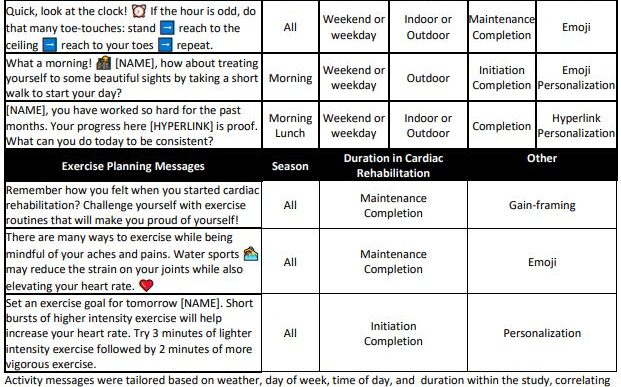The VALENTINE Study; evaluating a digital health intervention with the potential to augment and extend increased physical activity levels for cardiac rehabilitation enrollees

A recently published piece in the npj digital medicine journal highlights insights from the VALENTINE Study; a clinical trial in which participants enrolled in cardiac rehabilitation were randomized to receive usual care or to receive a digital health intervention designed to augment and extend the benefits of cardiac rehabilitation through increased physical activity. Precision Health member and Primary author Jessica Golbus, Clinical Instructor in Internal Medicine, Medical School, shares more information with us in conversation below:
Tell us a bit more about the details of this most recent publication & research:
Participants in the intervention group of the study had access to a mobile application and received text messages promoting increased physical activity (eg, walking) and exercise planning and which were tailored based on participants current environments. While the intervention did not significantly increase physical activity levels at 6-months, as assessed by remotely measured 6-minute walk distance, there was a significant increase in 6-minute walk distance at 3-months for Fitbit users. We also noted possible improvements in 6-minute walk distance at 6-months for Apple Watch users when adjusting for baseline factors. Overall, this suggests that the intervention did not have a long-term impact on physical activity that was sustained over time but may have intermediate or potentially device-specific effects.
What is innovative/new/exciting about this project?
Our study was innovative in multiple ways. First, the delivery of contextually tailored text messages to a cardiovascular disease population is quite novel. Future analyses will allow us to determine which types of text messages are most effective for which types of participants and then deliver only those messages in a future intervention. Second, we delivered the intervention over an extended period of time (ie, 6-months). Prior studies have delivered digital health interventions over much shorter periods of time, limiting researchers’ abilities to determine whether early effects would be sustained over time. Finally, we enrolled participants with both Android and Apple phones and provided them with a compatible watch (either an Apple Watch or Fitbit Versa 2, respectively). Thus we didn’t restrict the study population to a particular group of smartphone owners.
What is the outcome or anticipated outcome of this research?
Further analyses will help us to determine which types of tailored text messages are most effective and for which groups of patients. We will then use that information to design and deliver a future digital health intervention in which participants receive only the most effective text messages.
How it will benefit patients and clinicians?
Cardiac rehabilitation is an effective intervention for reducing cardiovascular morbidity and mortality for patients who have cardiovascular disease and is focused on increased physical activity and lifestyle modification. Unfortunately, patients’ physical activity levels often decline once they graduate from cardiac rehabilitation. A digital intervention like that delivered through the VALENTINE Study has the potential to help patients in maintaing increased physical activity levels over time. The VALENTINE Study, while negative overall, was a first step towards evaluating a digital health intervention with the potential to augment and then maintain increased physical activity levels for cardiac rehabilitation enrollees.
How does your work apply to the field of precision health?
The VALENTINE Study was designed to employ the core principles of precision health – namely deliver the right intervention, to the right participant, at the right time. Participants in the study received contextually tailored text messages which accounted for factors such as the weather, time of day, or day of week to ensure that the messages were highly relevant to their current environment in order to make them actionable.
Additional authors include: Kashvi Gupta, Rachel Stevens, V.Swetha E. Jeganathan, Evan Luff, Jieru Shi, Walter Dempsey, Thomas Boyden, Bhramar Mukherjee, Sarah Kohnstamm, Vlad Taralunga, Vik Kheterpal, Susan Murphy, Predrag Klasnja, Sachin Kheterpal & Brahmajee K. Nallamothu


